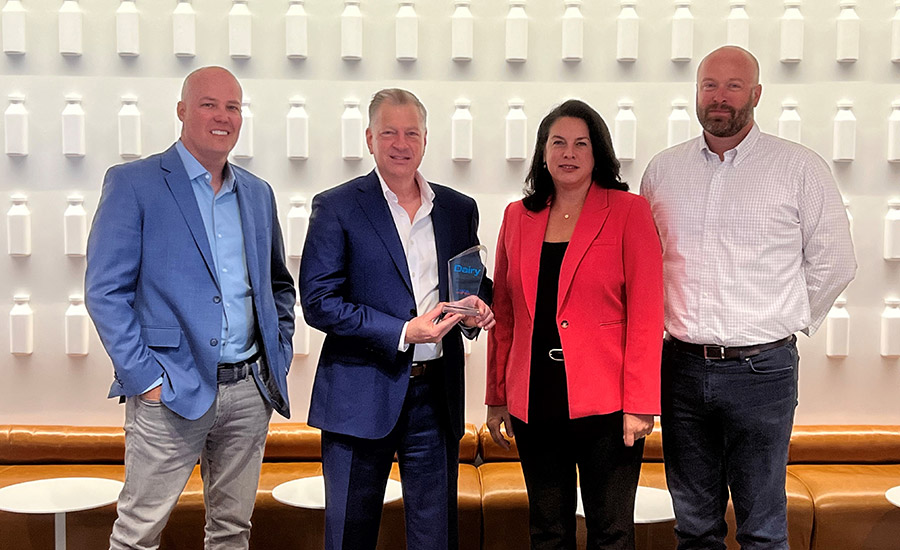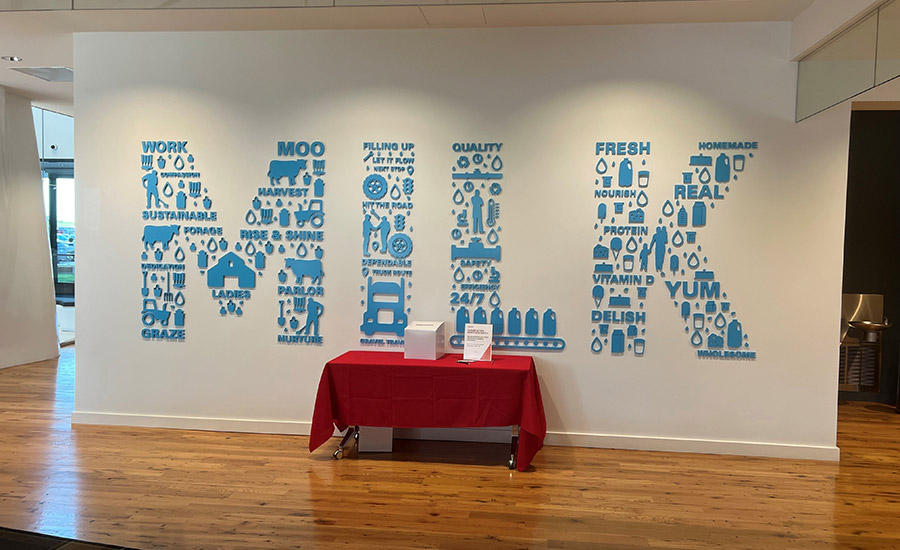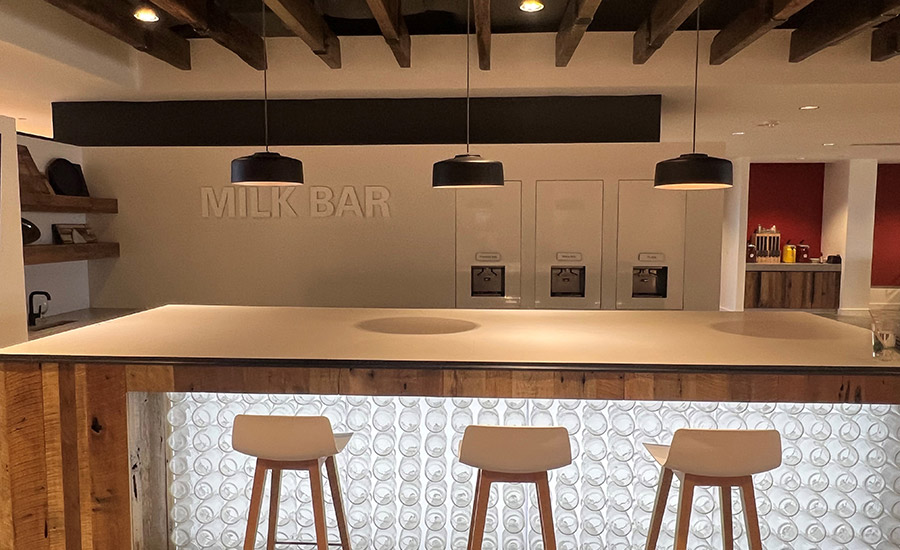Dairy Farmers of America is Dairy Foods 2023 Processor of the Year
December 15, 2023
Dairy Farmers of America is Dairy Foods 2023 Processor of the Year
December 15, 2023It has been an excellent past 12 months — and beyond — for Kansas City, Kan.-based Dairy Farmers of America (DFA), a national farmer-owned cooperative with nearly 11,000 family-farm owners and about 19,000 employees. It was named the recipient of the 2023 Dairy Foods Processor of the Year award.
In fact, DFA’s performance may only be bested in its hometown by the Super Bowl Champion Kansas City Chiefs, or October football jersey sales of its star player, Travis Kelce, following word he was dating music superstar Taylor Swift.
To start, DFA recently regained its position at the No. 1 spot on the Dairy Foods Top 100 list, following 2022 revenues of $24.5 billion, to go along with $108 million in net income. The $24.5 billion figure was an increase of $5.2 billion (or 26.8%) compared to its 2021 fiscal year.
DFA President and CEO Dennis Rodenbaugh cautioned some revenues moving forward will be affected by dairy markets, so earnings may fluctuate. “Every day, we need to improve how we are approaching things and making sure we are asking the right questions. Do we have the right optimization strategies? How do we ensure we’re looking out for our farmers’ best interests in both the short and long term?” he tells Dairy Foods.
A viable plan in place
Rodenbaugh joined DFA in 2007, and held numerous leadership positions since, culminating in stepping into the role of president and CEO in July 2022. One of the first challenges he had was to navigate the labor crisis.
“We had to bring our teams together to see how we would address this issue. We had about a 1,500 to, at times, a 2,000-employee gap. We were coming out of the pandemic and saw significant and ongoing changes in the U.S. and global economies. With these rapid changes taking place, there was a need for swift actions and alignments,” he stated.
Rodenbaugh immediately sought to change to a “one DFA mindset.” “In some cases, we were competing against ourselves,” Rodenbaugh acknowledges. “We did not have the alignment we needed; it was important to work to connect our cooperative across all of our businesses, locations, and focus areas.
Looking for a reprint of this article?
From high-res PDFs to custom plaques, order your copy today!
“Reconfiguring our debt structure was another priority focus,” he continues. “I wanted to make sure we could endure anything; that we learned from the uncertainty the pandemic caused. We accomplished that in record time. It’s important that the cooperative’s financials never become a burden to our farmers.”
The CEO also set out to coordinate DFA research and development and innovation efforts across the cooperative. “I believe we are going to be able to change the direction of dairy,” he said. “We have innovation opportunities across packaging, products, and the functionality of dairy. We must understand what consumers need and have the manufacturing capabilities to deliver against those needs. We are now doing that so much more efficiently. We have a best-in-class mentality, mindset, and protocols across all of our manufacturing businesses.”
Moving forward, DFA has adopted a “living strategy” to enable nimble reactions to environmental factors that impact the business, ensuring the focus is on priorities that bring the most value back to farmer-owners. This includes integrating the business activities across all 84 of its manufacturing plants. “We can now look where to employ capital as one DFA. This will expand our capabilities with our extended shelf life (ESL), for example,” Rodenbaugh notes. “We ordered 13 new lines of aseptic and ESL. We were able to determine where to best place our lines and now can serve our customers better. And we were able to use much less capital to achieve much more.”
 (Left to right) Kevin Strathman, executive vice president and chief financial officer, President and CEO Dennis Rodenbaugh; Jackie Klippenstein, senior vice president, chief government and industry relations officer; and Michael Lichte, chief insights and information officer.
(Left to right) Kevin Strathman, executive vice president and chief financial officer, President and CEO Dennis Rodenbaugh; Jackie Klippenstein, senior vice president, chief government and industry relations officer; and Michael Lichte, chief insights and information officer.
Acquisitions will also continue to be a part of DFA’s future, Rodenbaugh maintains. “We have been very acquisitive in our history. We will look at acquisitions when they meet core business and our farmers’ needs to give them a better return on their investments and improve synergies,” he says. “We have the financial capability and talent [to do so].”
Operations advancements
About a year ago, DFA acquired two ESL processing facilities from SmithFoods. The processing plants, located in Richmond, Ind., and Pacific, Mo., produce a variety of ESL dairy and non-dairy beverages, ice cream, and shake mixes for both retail and foodservice customers. The facilities became part of the DFA Dairy Brands division and operate as Richmond Beverage Solutions and Pacific Dairy Solutions.
“I saw Richmond, Ind., as an opportunity for us to begin to propel the concept of a national beverage network, integrated across the country from plants in California to our large manufacturing plant in Joplin, Mo., and beyond,” Rodenbaugh reveals. “We are on a long-term journey to make sure dairy is relevant and a go-to for consumers around the world. There are 8 billion people today, and we are moving toward 10 billion worldwide. We are focused on ensuring we can fulfill their nutrition needs in a sustainable way.
 DFA never forgets its roots, and the cooperative is always focused on its farmer-owners.
DFA never forgets its roots, and the cooperative is always focused on its farmer-owners.
“School milk is another example of where we are focused on consumers. We want kids to be life-long lovers of milk and dairy. We serve 22,000 school districts across the country,” Rodenbaugh continues. “Our goal is to be the best supplier and competitor in the school milk sector. We want to make sure kids have the opportunity and want to drink milk instead of choosing a drink filled with significant added sugars.”
Making milk “cool in school” is another goal of DFA. “We want to find ways to make milk cool in school again and make it the best quality product it can be,” Rodenbuagh stresses. “We have a great partnership with Disney and have numerous characters on our packaging in both schools and at retail, which has been met with a lot of excitement from both kids and moms. We believe we are best positioned to present the message around the nutrition package and deliver the taste benefits of milk, not just in schools, but also in the retail sector.”
Global plans in a singular effort
All 84 DFA North American manufacturing plants work in tandem serving U.S. markets, and a key focus is expanding and growing exports for the global markets. “That is part of our future plan,” says Martin Bates, president, global relations and marketing division, who previously served as president of ingredient solutions.
DFA’s Ingredient Solutions plant in Zumbrota, Minn., celebrated a significant expansion with a new specialty dryer, which allows for continued focus domestically and across global markets on growing the taste and flavor application segments that are used as flavoring ingredients in snacks, beverages, and prepared foods.
Its Ingredient Solutions facility in Fallon, Nev., continues to focus on innovation in milk powder capabilities to meet global customer application needs, particularly in the beverage space in existing and emerging global markets.
 One of the many benefits of being a DFA employee is the ability to utilize its milk bar.
One of the many benefits of being a DFA employee is the ability to utilize its milk bar.
“We have a great advantage as we can produce ingredients at other facilities, bring them into Fallon to further add value, and then move through Los Angeles or Oakland to the international market,” Bates tells Dairy Foods. “We have put in more silos and mixing areas, and we can now bring all of those components of a bucket of milk cream, protein, lactose, and vitamins and minerals, customize, add value, and export the products to match what consumers in international markets need.”
Bates adds international expansion will not be a one-way street. There is also an opportunity for DFA to partner with global companies to bring their brands to the U.S. “We have facilities that they can manufacture their products in,” he explains. “The United States is an attractive opportunity for international growth.”
New products and probiotics drive growth
Beyond manufacturing advancements, DFA Dairy Brands had a big year in 2023. It partnered with the Good Culture brand to introduce Good Culture Probiotic Milk, combining the nutrition of lactose-free milk with a patented probiotic shown to help support digestion and a healthy immune system.
Available in whole and 2% reduced-fat milk varieties, each 12-fluid-ounce serving provides one billion probiotic cultures and is a good source of vitamins A and D.
“We know consumers are very interested in probiotics for digestive and immunity benefits. The interest is even greater post-pandemic. This is the first-ever ESL milk that offers probiotics in a sufficient quantity to provide those benefits,” Rachel Kyllo, DFA Dairy Brands senior vice president of marketing and innovation, tells Dairy Foods. “The product is currently in about 3,000 stores in the eastern U.S.
“The trade reception has been excellent,” she continues. “[People] have been really excited about a product providing this new-to-the-market benefit. We have been very pleased with the product and have additional retailers who will sell it in January.”
Another big breakthrough in 2023 came from the Kemps brand, a wholly-owned subsidiary of DFA. Kemps introduced Kemps Smooth Cottage Cheese for kids, a new cottage cheese with no curds and a smooth and creamy texture.
The product launched in three flavors: Mixedberry, Strawberry, and Strawberry Banana. Kemps Smooth Cottage Cheese features special characters from the portfolio of Hasbro, including Peppa Pig, PJ Masks, and Transformers, in convenient four-ounce, four-cup packs.
 Right outside DFA’s doors lies its bocce ball courts, an enjoyable activity for many employees. DFA honors its past bocce ball winners with an award.
Right outside DFA’s doors lies its bocce ball courts, an enjoyable activity for many employees. DFA honors its past bocce ball winners with an award.
“Traditional cottage cheese is not a product that is high on a kids’ preference list,” Kyllo explains. “We start with regular 4% cottage cheese; we then smooth out the curds and add real blended fruit to make it a very creamy product. It results in a satisfying, kid-friendly taste. It delivers 10 grams of protein per serving, twice what would be in a normal kid yogurt product.”
The packaging also is designed to stand out on shelf. Kyllo explains: “We wanted to have graphics that are kid-friendly. So, we choose to license characters from Hasbro Equities. … The packaging is fun, exciting, and appealing to kids. And for moms, you cannot get a better protein benefit, which is helping drive strong sales. It is off to a good start and is sold in about 3,000 stores in the Midwest.”
And DFA and its company of brands are positioned to bring more unique brands to the forefront. “We believe presenting dairy products in innovative, new ways that meet consumers’ needs is really important,” Kyllo confirms. “We have a strong innovation process, grounded in consumer insights, and have a robust pipeline of innovative products in development.”
Sustainability and marketing goals
On a sustainability and marketing perspective — something that goes hand-in-hand at DFA — its farmer-owners and employees continue the cooperative’s commitment to drive forward its environmental, social, and governance efforts via on-farm sustainability initiatives as well as continuing the DFA Nerd Herd consumer educational campaign around sustainable farming practices and more.
Regarding sustainability, Jackie Klippenstein, senior vice president, chief government and industry relations officer, stresses it is a critical topic for both DFA and the dairy industry. DFA established its own sustainability goals through the Science Based Target initiative, whereby it will work toward reducing absolute emissions by 30% by 2030. It is also aligned with the dairy industry’s goal to achieve net neutrality by 2050.
“At DFA, we look at sustainability as an opportunity for farmers to receive benefits from practices they are seeking to implement on their farm,” Klippenstein relays. “Farmers have been on their lands, generation after generation, and want to leave their farms to their families. Healthier soil, better water, and clean air are all things they are thinking about as they look to produce quality milk, while raising a herd and their families on the same land.
“The fact that we now have customers and consumers interested in learning how the dairy industry can play a role in addressing the climate challenge is great,” she continues. “We are ready to step up, deliver that message and show progress.”
Reaching emissions goals will be challenged by the slow approval and availability of technology, Klippenstein acknowledges. It was anticipated that certain farmer-facing tools, like feed additives, would have been available in 2023. “But the other challenge is that the international carbon accounting system does not acknowledge the contribution farmers are making, nor does it drive environmental performance,” she says. “From our perspective, the accounting methodology is a tracking system that can be improved to better support farmers and drive innovation and more investment on the farm. While we are working with our farmer-owners to reach our goals, we are also working on aligning a global perspective to acknowledge and account for all of the good work farmers are doing.”
As for the Nerd Herd, Jenny Hofeditz, DFA’s vice president of marketing and public relations, recalled the decision to launch the campaign in 2020, in response to alternative dairy marketing perpetuating the notion that dairy is unsustainable. “The truth is, dairy is a solution as it relates to consumer’s sustainability concerns. We wanted to tell consumers the stories around the work our farmers are doing, raise awareness, and educate them about complex, scientific on-farm sustainability initiatives, but distill it down into bite-sized nuggets in a fun way, so they can understand the positive impact dairy can have on the planet,” she tells Dairy Foods.
Hence, the Nerd Herd campaign was launched in partnership with DFA farmers and the “Nerd Herd” that surrounds and supports them, including veterinarians, nutritionists, scientists, engineers, and more. “We are really just sharing what our farmers-owners are doing day in and day out,” Hofeditz states. “When we launched, we talked to sustainably minded Gen Zs and millennials. As we have gone on, we have narrowed that focus so we can target our media and messaging most effectively.”
DFA has identified a group of dairy consumers who believe dairy and sustainability can co-exist. “We want to help them advocate this message and share with others in their circle who care about sustainability that you can help the planet simply by supporting your local dairy farmers who are responsibly and sustainably producing dairy,” Hofeditz asserts.
“The Nerd Herd is the way we share what dairy can do, and we’re leaning into consumer insights to anchor our messages. For example, consumer insights show that climate change specifically is a concern associated with sustainability needs,” she continues. “We addressed that specifically in 2022 by leaning into the spicy food trend. One of our commercial spots highlights how milk has cooling properties that can cool your mouth when you eat spicy food, but also shows how our farming techniques and initiatives can also help cool the planet.”
In 2023, the Nerd Herd campaign has focused on those who live in cities and the impact on-farm sustainability outputs can have on a busy city dweller’s life. “Our most recent Nerd Herd spot shows how renewable energy generated from a single dairy can help power not only the commercial we made, but also an entire city. We also did billboards in key media markets showing the impact a single farm could have in that particular city. For example, in the Gaslamp District of San Diego, a lot of people ride e-scooters. Our billboard there shows how a single farm could power 32 million e-scooter trips a year,” Hofeditz reveals. “We want consumers in the city to understand the impact a single dairy farm can have on the cities they live in. We are also including our farmer-owner brands that are available in each market where the campaign runs, giving consumers a way to support sustainable dairy locally.”
 Dennis Rodenbaugh joined DFA in 2007 and took over as CEO in July 2022. The company earned $24.5 billion in revenues in 2022, No. 1 on Dairy Foods' Top 100 list.
Dennis Rodenbaugh joined DFA in 2007 and took over as CEO in July 2022. The company earned $24.5 billion in revenues in 2022, No. 1 on Dairy Foods' Top 100 list.
Another objective of the Nerd Herd campaigns is to encourage consumption across all dairy products, especially as milk consumption has declined in recent years, purportedly in some part due to younger generations’ opinions about sustainability.
“We must counter what the false plant-based narrative is with the facts. Hofeditz says. “The truth is, dairy is sustainable and delivers a nutrition profile that cannot be matched. We want to share the work our farmers are doing and the impact it can have. We want to make sure this generation not only feels good about the sustainability impact of dairy but is also aware of the nutrition and health benefits that exist,” Hofeditz adds. “It is about painting the broader picture in terms of awareness and education. … We want to deliver the right message, at the right time to the right consumer.”
DFA celebrates 25 years
DFA’s Processor of the Year award comes during the cooperative’s 25th anniversary. DFA was formed in 1998 by four regional cooperatives, when they decided to form a national cooperative, as opposed to competing against each other when selling milk. An important aspect has always been ensuring farmer-owners have a say in the supply chain.
“The first several years was about coming together and being one entity,” Kristen Coady, senior vice president and chief communications officer says. “In 2006, the cooperative set a five-year plan and looked at its strategic investments, which led to the divestitures of some plants and purchases of others. That led us to today and the ownership of 84 plants, as well as contract manufacturing, ESL and aseptic beverages, as well as ingredients.”
DFA is well known for its Borden Cheese brand, Kemps milk, and Hispanic Brand La Vaquita, which is the No. 1 cheese brand in Houston; as well as many brands acquired from the Dean Foods bankruptcy.
In honor of its 25th anniversary, Coady notes a book chronicling DFA’s history will soon be released. “It’s a look back on our history. It looks at how and why DFA was formed and how it brings value to the owners of this cooperative,” Coady concludes. “It takes us through the journey and goes way beyond simply stating something happened in a given year. We are looking forward to the next 25 years and continuing to support and work alongside our farmer-owners.”
Editor’s note: Only the things mentioned in this story were considered for the Processor of the Year award. Dairy Foods did not take any other aspects into account.










